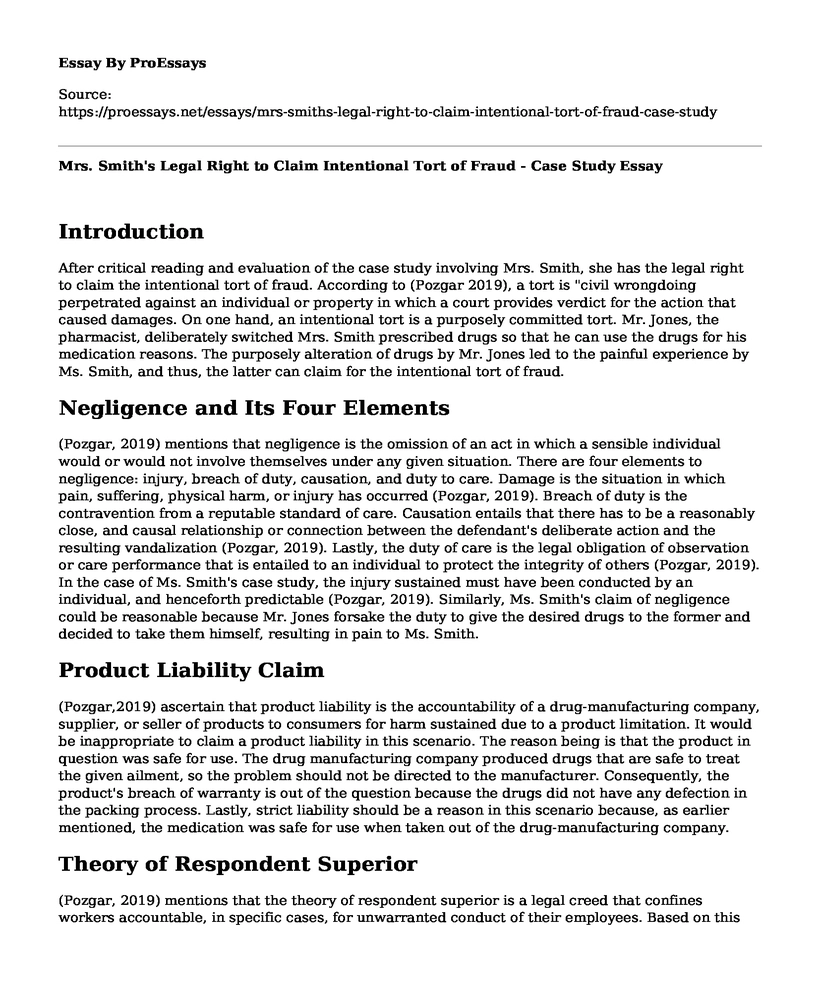Introduction
After critical reading and evaluation of the case study involving Mrs. Smith, she has the legal right to claim the intentional tort of fraud. According to (Pozgar 2019), a tort is "civil wrongdoing perpetrated against an individual or property in which a court provides verdict for the action that caused damages. On one hand, an intentional tort is a purposely committed tort. Mr. Jones, the pharmacist, deliberately switched Mrs. Smith prescribed drugs so that he can use the drugs for his medication reasons. The purposely alteration of drugs by Mr. Jones led to the painful experience by Ms. Smith, and thus, the latter can claim for the intentional tort of fraud.
Negligence and Its Four Elements
(Pozgar, 2019) mentions that negligence is the omission of an act in which a sensible individual would or would not involve themselves under any given situation. There are four elements to negligence: injury, breach of duty, causation, and duty to care. Damage is the situation in which pain, suffering, physical harm, or injury has occurred (Pozgar, 2019). Breach of duty is the contravention from a reputable standard of care. Causation entails that there has to be a reasonably close, and causal relationship or connection between the defendant's deliberate action and the resulting vandalization (Pozgar, 2019). Lastly, the duty of care is the legal obligation of observation or care performance that is entailed to an individual to protect the integrity of others (Pozgar, 2019). In the case of Ms. Smith's case study, the injury sustained must have been conducted by an individual, and henceforth predictable (Pozgar, 2019). Similarly, Ms. Smith's claim of negligence could be reasonable because Mr. Jones forsake the duty to give the desired drugs to the former and decided to take them himself, resulting in pain to Ms. Smith.
Product Liability Claim
(Pozgar,2019) ascertain that product liability is the accountability of a drug-manufacturing company, supplier, or seller of products to consumers for harm sustained due to a product limitation. It would be inappropriate to claim a product liability in this scenario. The reason being is that the product in question was safe for use. The drug manufacturing company produced drugs that are safe to treat the given ailment, so the problem should not be directed to the manufacturer. Consequently, the product's breach of warranty is out of the question because the drugs did not have any defection in the packing process. Lastly, strict liability should be a reason in this scenario because, as earlier mentioned, the medication was safe for use when taken out of the drug-manufacturing company.
Theory of Respondent Superior
(Pozgar, 2019) mentions that the theory of respondent superior is a legal creed that confines workers accountable, in specific cases, for unwarranted conduct of their employees. Based on this theory, an employer is answerable to any tort committed by their workers. In that perspective, Acme Drug could be held accountable if Ms. Smith put forward the claim. The reason being is that it was in their knowledge that Mr. Jones controlled substance issues and was previously in rehabilitation, which subsequently led to immense pain by Mr. Smith.
References
Pozgar, G. D. (2019). Legal aspects of health care administration (13th ed.). Burlington, MA: Jones & Bartlett Learning.
Cite this page
Mrs. Smith's Legal Right to Claim Intentional Tort of Fraud - Case Study. (2023, Aug 03). Retrieved from https://proessays.net/essays/mrs-smiths-legal-right-to-claim-intentional-tort-of-fraud-case-study
If you are the original author of this essay and no longer wish to have it published on the ProEssays website, please click below to request its removal:
- Are Cyber-attacks a Threat to Today's Society? Essay Example
- Essay on Eye Witness Justification
- Justice in Disguise - Essay Sample
- Falsely Accused/Racial Controversy - Research Paper
- Juveniles Sentenced as Adults Essay Example
- Research Paper on Family and Criminal Law
- Criminal Justice in California - Report Example







